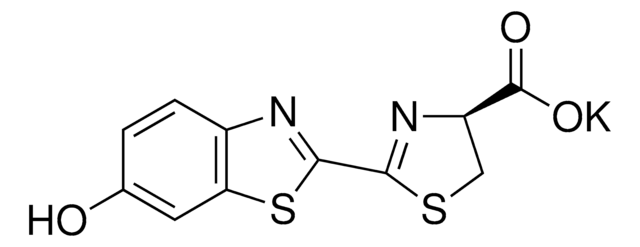P1472
Potassium carbonate
meets USP testing specifications
Synonym(s):
Carbonic acid, Pearl ash, Salt of tartar, dipotassium salt, potash
About This Item
Recommended Products
Agency
USP/NF
meets USP testing specifications
Quality Level
Assay
99.5-100.5%
form
crystalline
mp
891 °C (lit.)
solubility
soluble 138 g/L at 20 °C (completely)
application(s)
pharmaceutical (small molecule)
SMILES string
[K+].[K+].[O-]C([O-])=O
InChI
1S/CH2O3.2K/c2-1(3)4;;/h(H2,2,3,4);;/q;2*+1/p-2
InChI key
BWHMMNNQKKPAPP-UHFFFAOYSA-L
Looking for similar products? Visit Product Comparison Guide
General description
Application
- Improved 2-pyridyl reductive homocoupling reaction using biorenewable solvent Cyrene™(dihydrolevoglucosenone).: This study highlights the use of potassium carbonate as a base in a green chemistry context, demonstrating improved reductive homocoupling reactions with the use of the biorenewable solvent Cyrene™. The findings suggest significant applications in sustainable chemical processes (Webb et al., 2023).
- Synthesis, Characterization and Biological Evaluation of Magnolol and Honokiol Derivatives with 1,3,5-Triazine of Metformin Cyclization.: This research discusses the synthesis and biological evaluation of novel derivatives using potassium carbonate, which plays a crucial role in the cyclization process. The study has implications for drug development and medicinal chemistry (Ren et al., 2020).
- Synthesis of (18)F-radiolabeled organophosphine fluorides for thiol-chemoselective peptide conjugation.: The use of potassium carbonate in the synthesis of radiolabeled compounds is detailed in this paper, highlighting its application in biochemistry and molecular biology for the development of novel imaging agents (Zhuang et al., 2020).
- Synthesis of well-defined phosphate-methylated DNA fragments: the application of potassium carbonate in methanol as deprotecting reagent.: This study focuses on the critical role of potassium carbonate in the deprotection step during the synthesis of methylated DNA fragments, with implications for genetic research and biotechnology (Kuijpers et al., 1990).
Biochem/physiol Actions
Legal Information
Signal Word
Warning
Hazard Statements
Precautionary Statements
Hazard Classifications
Eye Irrit. 2 - Skin Irrit. 2 - STOT SE 3
Target Organs
Respiratory system
Storage Class Code
13 - Non Combustible Solids
WGK
WGK 1
Flash Point(F)
Not applicable
Flash Point(C)
Not applicable
Personal Protective Equipment
Choose from one of the most recent versions:
Certificates of Analysis (COA)
Don't see the Right Version?
If you require a particular version, you can look up a specific certificate by the Lot or Batch number.
Already Own This Product?
Find documentation for the products that you have recently purchased in the Document Library.
Customers Also Viewed
Our team of scientists has experience in all areas of research including Life Science, Material Science, Chemical Synthesis, Chromatography, Analytical and many others.
Contact Technical Service








